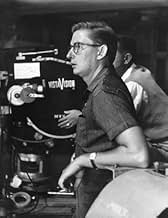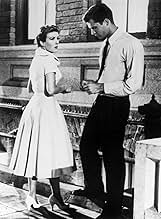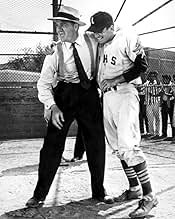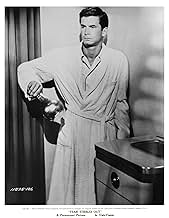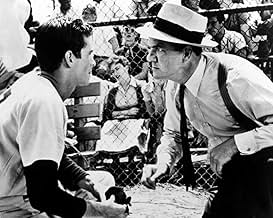IMDb RATING
6.9/10
2.2K
YOUR RATING
True story of the life of Jimmy Piersall, who battled mental illness to achieve stardom in major league baseball.True story of the life of Jimmy Piersall, who battled mental illness to achieve stardom in major league baseball.True story of the life of Jimmy Piersall, who battled mental illness to achieve stardom in major league baseball.
- Awards
- 1 nomination total
John Aberle
- Ballplayer
- (uncredited)
Eric Alden
- Policeman
- (uncredited)
Heather Ames
- Nurse
- (uncredited)
Sam Balter
- Broadcaster
- (voice)
- (uncredited)
Mary Benoit
- Nurse
- (uncredited)
John Benson
- Reporter
- (uncredited)
Don Brodie
- Reporter Evans
- (uncredited)
Richard Bull
- Reporter Slade
- (uncredited)
Bart Burns
- Joe Cronin
- (uncredited)
Edd Byrnes
- Boy in Car Assisting Jimmy Up Stairway
- (uncredited)
Wade Cagle
- Intern
- (uncredited)
Keith Coyne
- Baby
- (uncredited)
Featured reviews
FEAR STRIKES OUT has to be the classic compulsive "sports Dad" movie. I think every father with a son in sports should be required to see this film--especially after what we've seen recently with regard to parents in fist fights at their sons' Little League games. If ever there was an overbearing, driving patriarchal figure trying to live out his past inadequacies through his son in sports, Jimmy Piersall's father was he. In fact, I watch this movie not so much for the Jimmy Piersall story so much as to see Karl Malden's portrayal of John Piersall! Of course, we don't know how much is embellished, but if Mr. Piersall was even half of what is depicted in this movie, it is little wonder that Jimmy Piersall once hit a home run and ran around the bases backwards...
Could anyone play a more iron-fisted character than Karl Malden? Watch PARRISH (1963) or BOMBERS B-52 sometime to see the equal of Piersall's Dad in FEAR STRIKES OUT. And Piersall's mother? Again, no one knows how accurate the depiction is, but she is a ghost presence and if that is true, it's just another nail in Piersall's psychological coffin.
Even watching this movie as a kid, I was uncomfortable seeing Piersall pounded cruelly again and again by his Dad to do better, to go higher, to do more. Once he's romanced by The Boston Red Sox, Mr. Piersall becomes Jimmy's indispensable "advisor." All of this grows until Jimmy can do nothing without consulting Dad. The result is his father's eternal presence between his ears and the classic breakdown scene at the park when Piersall climbs the fence, an unforgettable moment, especially if you see this as an adolescent.
Reviews concerning Anthony Perkins'lack of athletic ability always come up when this movie is discussed. Actually, this was characteristic of most sports movie bio's back in the 1940's and 1950's. Watch William Bendix as Babe Ruth, Ronald Reagan as Grover Cleveland Alexander, or Dan Daily as Dizzy Dean. Routine throwing and catching resembles something you used to see a "nerd" do at school recess. And this movie quirk wasn't present in baseball films only.
I've always wondered just who this movie is about: Jimmy Piersall or his father? The scene in which the psychiatrist confronts Mr. Piersall at the sanitarium is painful and very sad. I've also always wondered just what Piersall's thoughts must have been when this movie hit the screens: for his was still active in the major leagues. How many teams did Jimmy Piersall play for? How many fist fights? And his announcing career? Full of controversy. Maybe it would have all happened without John Piersall, but it is doubtful. Next time a boy wishes his father was more into sports, remind him of John Piersall.
Exhibit 'A' for all fathers living vicariously through the sports achievements of their sons.
Dennis Caracciolo
Could anyone play a more iron-fisted character than Karl Malden? Watch PARRISH (1963) or BOMBERS B-52 sometime to see the equal of Piersall's Dad in FEAR STRIKES OUT. And Piersall's mother? Again, no one knows how accurate the depiction is, but she is a ghost presence and if that is true, it's just another nail in Piersall's psychological coffin.
Even watching this movie as a kid, I was uncomfortable seeing Piersall pounded cruelly again and again by his Dad to do better, to go higher, to do more. Once he's romanced by The Boston Red Sox, Mr. Piersall becomes Jimmy's indispensable "advisor." All of this grows until Jimmy can do nothing without consulting Dad. The result is his father's eternal presence between his ears and the classic breakdown scene at the park when Piersall climbs the fence, an unforgettable moment, especially if you see this as an adolescent.
Reviews concerning Anthony Perkins'lack of athletic ability always come up when this movie is discussed. Actually, this was characteristic of most sports movie bio's back in the 1940's and 1950's. Watch William Bendix as Babe Ruth, Ronald Reagan as Grover Cleveland Alexander, or Dan Daily as Dizzy Dean. Routine throwing and catching resembles something you used to see a "nerd" do at school recess. And this movie quirk wasn't present in baseball films only.
I've always wondered just who this movie is about: Jimmy Piersall or his father? The scene in which the psychiatrist confronts Mr. Piersall at the sanitarium is painful and very sad. I've also always wondered just what Piersall's thoughts must have been when this movie hit the screens: for his was still active in the major leagues. How many teams did Jimmy Piersall play for? How many fist fights? And his announcing career? Full of controversy. Maybe it would have all happened without John Piersall, but it is doubtful. Next time a boy wishes his father was more into sports, remind him of John Piersall.
Exhibit 'A' for all fathers living vicariously through the sports achievements of their sons.
Dennis Caracciolo
I still remember seeing this as a Little League-age kid in the theater as our family was vacationing in Florida.
When I saw it again, some 40 years later, parts of the film were still very familiar, a testimony to how powerful some of these scenes were. I never forgot them.
This was a based-on-a-true-life account of major league baseball player Jimmy Piersall, a very talented player who suffered a nervous breakdown. The enormous pressure to succeed that was driven into him by his never-satisfied father was pictured as the cause which made him snap.
Anthony Perkins, who plays Piersall, and Karl Madlen, who portrays his dad, are both excellent, riveting characters. Some say this was Malden's best performance ever. Perkins was no slouch, either. This is the classic sports story of an overzealous parent living his or her dreams through their child.
The baseball segment of this film ended about halfway through. From that point, after Perkins breaks down at the park, climbing the backstop fence in a horrifying scene, the film actually gets even more interesting with everyone in the film contributing although the cast, after Perkins and Malden, is a pretty much an unknown-name one.
The only unrealistic part of the film, typical of sports films until the 1980s, was seeing an actor play a ballplayer when he "throws like a girl," as the old expression went. The younger actor playing Piersall as a kid was no better than Perkins in this regard. Neither had a clue how to a throw a ball. It looks corny nowadays.
Oh, well. That wasn't the focus of the story, anyway. As powerful as this film was, it apparently didn't have much of an effect as pushy parents in sports still exist and probably always will, taking the fun out of sports for a number of kids.
It's still a memorable film and worth your time today, especially if you have never seen it.
When I saw it again, some 40 years later, parts of the film were still very familiar, a testimony to how powerful some of these scenes were. I never forgot them.
This was a based-on-a-true-life account of major league baseball player Jimmy Piersall, a very talented player who suffered a nervous breakdown. The enormous pressure to succeed that was driven into him by his never-satisfied father was pictured as the cause which made him snap.
Anthony Perkins, who plays Piersall, and Karl Madlen, who portrays his dad, are both excellent, riveting characters. Some say this was Malden's best performance ever. Perkins was no slouch, either. This is the classic sports story of an overzealous parent living his or her dreams through their child.
The baseball segment of this film ended about halfway through. From that point, after Perkins breaks down at the park, climbing the backstop fence in a horrifying scene, the film actually gets even more interesting with everyone in the film contributing although the cast, after Perkins and Malden, is a pretty much an unknown-name one.
The only unrealistic part of the film, typical of sports films until the 1980s, was seeing an actor play a ballplayer when he "throws like a girl," as the old expression went. The younger actor playing Piersall as a kid was no better than Perkins in this regard. Neither had a clue how to a throw a ball. It looks corny nowadays.
Oh, well. That wasn't the focus of the story, anyway. As powerful as this film was, it apparently didn't have much of an effect as pushy parents in sports still exist and probably always will, taking the fun out of sports for a number of kids.
It's still a memorable film and worth your time today, especially if you have never seen it.
This a very interesting, but not totally factual, account of the life of Jimmy Piersall. Piersall was a popular player with the Boston Red Sox. His antics on and off the field are now legendary. Piersall fell in love with baseball at a young age, but his domineering father forced Jimmy to not only achieve, but to play to perfection. Mr. Piersall's constant manipulating can be traced to his son's mental breakdown.
Anthony Perkins puts in a dedicated performance as Jimmy Piersall. Karl Malden excelled as the relentless Mr. Piersall. Also in the cast are Bart Burns, Norma Moore and Adam Williams.
This is a very stark and interesting movie, just don't take all the content as gospel. A baseball fan's delight.
Anthony Perkins puts in a dedicated performance as Jimmy Piersall. Karl Malden excelled as the relentless Mr. Piersall. Also in the cast are Bart Burns, Norma Moore and Adam Williams.
This is a very stark and interesting movie, just don't take all the content as gospel. A baseball fan's delight.
I don't find movies about illnesses whether they are physical or mental, real or fictitious, to be entertaining, maybe informative or educational, so I am approaching my criticism of this movie from the baseball aspect. Jimmy Piersall was quite a character. He overcame a mental breakdown to become one of the greatest outfielders in baseball history. He was a real crowd pleaser with his fielding and antics, but his hitting left a lot to be desired. He just about ruined his arm showing off how far and hard he could throw the ball. When he hit his 100th homerun, he ran the bases backwards. Living near Boston, I saw him play ball on many occasions and I met him in person at a First National Supermarket opening in Lawrence, Mass. He signed a baseball and a photograph of himself for me, but I had to buy two bags of potato chips (Cains, I think it was) beforehand. As a kid, I could barely afford it, but more than fifty years later, I still have the ball and photo. What a thrill it was! I remember him as being handsome and big and strong, not a skinny guy like Anthony Perkins. As far as the movie goes, it was good, but not very accurate. Did you notice the obvious padding to Perkin's shoulders to make him look bulky? He looked like he never played baseball in real life, he was so awkward. (Gary Cooper as Lou Gehrig and William Bendix as Babe Ruth also looked pretty bad in their baseball movies). Did you notice that the stock footage was of Fenway Park but whenever Perkins was playing they showed some minor league park? Just look at the outfield background, that's not Fenway. What really bothers me is that they only mention one real life Red Sox person, Joe Cronin, and that was wrong, it should have been Pinky Higgins. What happened to Ted Williams, Jackie Jensen (my all time favorite Red Sox player), Dom Dimaggio, Bobby Doerr, Johnny Pesky, and a bunch of others who played on the team with Piersall? Ted's career was actually extended because Piersall was so good as a fielder that he used to run from center to left to catch flyballs so that Williams didn't have to tire himself out trying to get to them. Piersall was eventually traded to another team, so all his euphoria about playing for the Bosox didn't last. Still with all its' faults and disappointments, this movie is well worth watching, especially for baseball fans.
True story of Boston Red Sox outfielder Jimmy Piersall, Anthony Perkins, struggle with mental illness by desperately wanting to please his domineering father John, Karl Malden, to be a big league baseball player. At the same time Jimmy confronted his insecurities of not having what it takes to be one. Growing up as a boy in Waterbuary Ct. Jimmy always dreamed of playing for the Red Sox not just to play professional baseball but to be able to get out of the poverty that he and his parents were stuck in all their lives.
Jimmy's father John played semi-pro ball as a young man but never had the talent to play in the big leagues and put all his effort and drive to see that Jimmy would get the chance, playing professional baseball, that he never got. Helpful at first but as John's obsession in getting Jimmy to make the grade started to take it's toll on the sensitive young man, As he finally reached his goal of making the team, fear set in on Jimmy fear that he'll fail his dad and himself. That fear lead Jimmy to have a mental breakdown during a night-game in Fenway Park after hitting an inside-the-park home run.
"Fear Strikes Out" covers Jimmy Piersall's life from a 12 year old boy in Waterbuary Ct. through his being committed into a institution for treatment of his mental illness due to the his fear that he'll never be the person that his father wanted him to be. As well as the fear that he wouldn't be able to care and provide for his parents and newlywed wife Mary, Norma Moore, and their new born daughter Eileen.
Being looked after by Dr. Brown, Adam Williams, at the institution it's painful to see Jimmy completely lose it and end up looking and acting like a person who's been lobotomized. Dr. Brown get's Jimmy to respond to his treatment by showing him the kindness and understanding that his father lacked for Jimmy during his formative years. That caused him to not just enjoy playing baseball but to become obsessed by it in wanting to fulfill the dreams that his dad had for him.
This pressure built up over the years as Jimmy worked hard to make the majors and play along the likes of baseball greats like Ted Williams Mickey Mantle and Willie Mays. There was a terrible price to all that and that price was that no matter how hard Jimmy tried he was never good enough, or as good as he could be, in the eyes of his dad John Piersall.
It turned out that it was not just Jimmy who needed mental therapy but his father as well in understanding that his son was a human being not a machine who's feeling had to be taken into account. John Piersall was relentlessly driving Jimmy to make the grade as a big league baseball player not caring, or noticing, that he was driving Jimmy straight into a nervous breakdown. Even Boston Red Sox manager Joe Cronin, Bart Burns, was more receptive to Jimmy's impending mental collapse then his father. Cronin did everything he could, through the Red Sox organization, to help Jimmy with desperately needed professional help that Jimmy's father had no idea that his son needed.
The best part of the movie "Fear Strikes Out" was when John Piersall finally understood what he did to his son Jimmy in pushing him like he did. Later at the institution John was accepted by Jimmy who for a time wanted to have nothing to do with him. For once just being his father, not a hard as nails lion trainer, the two had an friendly but emotional game of catch.
Jimmy did in the end recover form his personal demons and went on to be an All-Star outfielder for Boston Cleveland and the New York Mets, among outer teams he played for. Despite his fine record as a professional baseball player Jimmys overcoming the fear that almost destroyed him was by far Piersall's greatest achievement.
Jimmy's father John played semi-pro ball as a young man but never had the talent to play in the big leagues and put all his effort and drive to see that Jimmy would get the chance, playing professional baseball, that he never got. Helpful at first but as John's obsession in getting Jimmy to make the grade started to take it's toll on the sensitive young man, As he finally reached his goal of making the team, fear set in on Jimmy fear that he'll fail his dad and himself. That fear lead Jimmy to have a mental breakdown during a night-game in Fenway Park after hitting an inside-the-park home run.
"Fear Strikes Out" covers Jimmy Piersall's life from a 12 year old boy in Waterbuary Ct. through his being committed into a institution for treatment of his mental illness due to the his fear that he'll never be the person that his father wanted him to be. As well as the fear that he wouldn't be able to care and provide for his parents and newlywed wife Mary, Norma Moore, and their new born daughter Eileen.
Being looked after by Dr. Brown, Adam Williams, at the institution it's painful to see Jimmy completely lose it and end up looking and acting like a person who's been lobotomized. Dr. Brown get's Jimmy to respond to his treatment by showing him the kindness and understanding that his father lacked for Jimmy during his formative years. That caused him to not just enjoy playing baseball but to become obsessed by it in wanting to fulfill the dreams that his dad had for him.
This pressure built up over the years as Jimmy worked hard to make the majors and play along the likes of baseball greats like Ted Williams Mickey Mantle and Willie Mays. There was a terrible price to all that and that price was that no matter how hard Jimmy tried he was never good enough, or as good as he could be, in the eyes of his dad John Piersall.
It turned out that it was not just Jimmy who needed mental therapy but his father as well in understanding that his son was a human being not a machine who's feeling had to be taken into account. John Piersall was relentlessly driving Jimmy to make the grade as a big league baseball player not caring, or noticing, that he was driving Jimmy straight into a nervous breakdown. Even Boston Red Sox manager Joe Cronin, Bart Burns, was more receptive to Jimmy's impending mental collapse then his father. Cronin did everything he could, through the Red Sox organization, to help Jimmy with desperately needed professional help that Jimmy's father had no idea that his son needed.
The best part of the movie "Fear Strikes Out" was when John Piersall finally understood what he did to his son Jimmy in pushing him like he did. Later at the institution John was accepted by Jimmy who for a time wanted to have nothing to do with him. For once just being his father, not a hard as nails lion trainer, the two had an friendly but emotional game of catch.
Jimmy did in the end recover form his personal demons and went on to be an All-Star outfielder for Boston Cleveland and the New York Mets, among outer teams he played for. Despite his fine record as a professional baseball player Jimmys overcoming the fear that almost destroyed him was by far Piersall's greatest achievement.
Did you know
- TriviaThe real Jimmy Piersall disowned the movie due to its distortion of the facts. Based on the success of his autobiography and the movie, Piersall penned a second book in 1985 called The Truth Hurts, which detailed his ousting from the White Sox organization.
- GoofsClose-up shots of Jimmy Piersall playing shortstop and right field reveal a low outfield wall backed by trees in the background. These games were supposed to be in Fenway Park, which would have a high left field wall and bleachers in right field.
- Quotes
Jim Piersall: I don't care what happens. I love you Mary!
- ConnectionsFeatured in Diamonds on the Silver Screen (1992)
Details
- Runtime1 hour 40 minutes
- Color
- Aspect ratio
- 1.85 : 1
Contribute to this page
Suggest an edit or add missing content

Top Gap
By what name was Prisonnier de la peur (1957) officially released in Canada in English?
Answer

